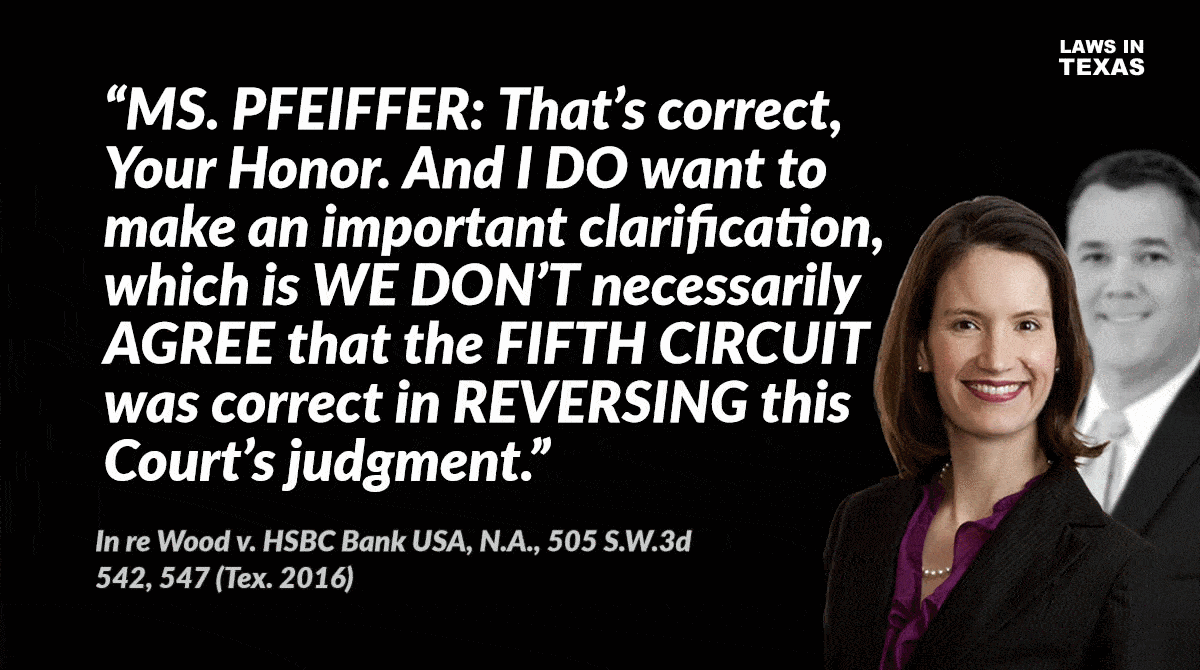Our holding is a narrow one: we merely reaffirm that under Texas law, facially valid assignments cannot be challenged for want of authority except by the defrauded assignor.
We do not condone “robo-signing” more broadly and remind that bank employees or contractors who commit forgery or prepare false affidavits subject themselves and their supervisors to civil and criminal liability.
We agree with the Reinagels. To be sure, Texas courts have held that a non-party to a contract cannot enforce the contract unless she is an intended third-party beneficiary,6 occasionally couching this principle in terms of “standing.”7 Here, however, the Reinagels are not attempting to enforce the terms of the instruments of assignment; to the contrary, they urge that the assignments are void ab initio. Though “the law is settled” in Texas that an obligor cannot defend against an assignee’s efforts to enforce the obligation on a ground that merely renders the assignment voidable at the election of the assignor, Texas courts follow the majority rule that the obligor may defend “on any ground which renders the assignment void.”8
A contrary rule would lead to the odd result that Deutsche Bank could foreclose on the Reinagels’ property though it is not a valid party to the deed of trust or promissory note, which, by Deusche Bank’s reasoning, should mean that it lacks “standing” to foreclose.

‘People Should Be Going To Prison’: Ocwen To Pay $11M, But…
‘People Should Be Going to Prison’: Ocwen to Pay $11M, but Florida Lawyers Say That’s Not Enough
Posted on October 16, 2020 | Republished by LIT: Dec 27, 2020
‘People Should Be Going To Prison’: Ocwen To Pay $11M, But…
‘People Should Be Going to Prison’: Ocwen to Pay $11M, but Florida Lawyers Say That’s Not Enough
Posted on October 16, 202o | Republished by LIT: Dec 27, 2020
Lawyers who litigated against the company in separate cases criticized the agreement as weak.
“While residential foreclosures are at a temporary lull due to federal moratoriums, these moratoriums, just like Florida’s, will come to a halt by this year’s end. Then we shall see a spike in new foreclosure filings starting by the second quarter of 2021.
All I can say is with the lax enforcement as evidenced by the latest Florida Ocwen settlement one should not expect the bank’s to have learned anything from the last decade foreclosure crisis.
In fact, besides being emboldened, the only thing the banks have learned is the Golden Rule:
He who holds the gold, continues to rule and that the legal and judicial system will look the other way to expediently allow foreclosures to rip through the system regardless of improprieties and social economic ramifications.” – Roy Oppenheim
One of the leading nonbank mortgage servicing companies agreed Thursday to pay millions of dollars in relief for Floridians harmed by its mortgage servicing practices.
But lawyers who litigated against the company in separate cases criticized the agreement as weak.
Florida Attorney General Ashley Moody reached the $11 million agreement with Ocwen Financial Corp. and its subsidiaries over Ocwen’s alleged servicing failures, including untimely payments of borrowers’ insurance premiums, the improper imposition of lender-placed insurance, and overcharges for property preservation inspections.
The agreement provides for Ocwen to make at least $8.6 million in payments, specific loan modifications and waivers, including $1 million in mortgage loan modifications, $5.5 million in late fee waivers for eligible borrowers, and more than $3 million in civil penalties and reimbursement to the attorney general’s office for fees and costs.
Now, pending approval by the U.S. District Court for the Southern District of Florida, the proposed final consent judgment will resolve the lawsuit brought by the Florida attorney general.
However, while the attorney general’s office may be celebrating, South Florida litigators like Bruce Jacobs, a partner at Jacobs Legal in Miami, said the attorney general’s office’s announcement was frustrating.
“There’s another settlement that doesn’t send any type of message to anybody,” Jacobs said. “People should be going to prison for the type of misconduct going on. They took peoples’ homes with inaccurate information.”
Bridget Berry, a partner at Greenberg Traurig in West Palm Beach who represents Ocwen Financial in the case, did not respond to a request for comment.
Jacobs is litigating against Ocwen in a separate case, in which he was preparing a motion to strike objections, and for sanctions against Ocwen, when news of the proposed final consent judgment was released.
Jacob is preparing to cite to a 2019 Eleventh Circuit Court of Appeal ruling, Carvelli v. Ocwen Fin. Corp., in which the court noted that Ocwen’s software was incapable of tracking borrowers’ accounts and payments, including interest and late fees, for up to “90% of the loans in the system.”
‘Add one or two zeros’
Another foreclosure defense lawyer is also unhappy with the news.
Roy Oppenheim, co-founder and senior partner of Oppenheim Law in Boca Raton, who has also had cases against Ocwen, said the proposed final consent judgment does not provide any evidentiary foundation for individual plaintiffs to take action.
“All the work the government did, lawyers can’t use for any kind of discovery,” Oppenheim said. “If they built a trough of information like against big tobacco, where you can go in and get that information and use it in a lawsuit, that’s great. But that’s not what happened.”
Oppenheim argued the millions of dollars in penalties paid by Ocwen were insufficient to compensate Floridians who were adversely affected by the type of alleged misconduct committed by the nonbank mortgage servicing company, including the vague information provided about debt forgiveness through loan modification agreements.
“You have to add one or two zeros to everything,” Oppenheim said. “If an average mortgage is $300,000, they’re going to give debt relief to three people in the state of Florida? Or are they going to knock off $30,000 from 100 peoples’ mortgages?”


















